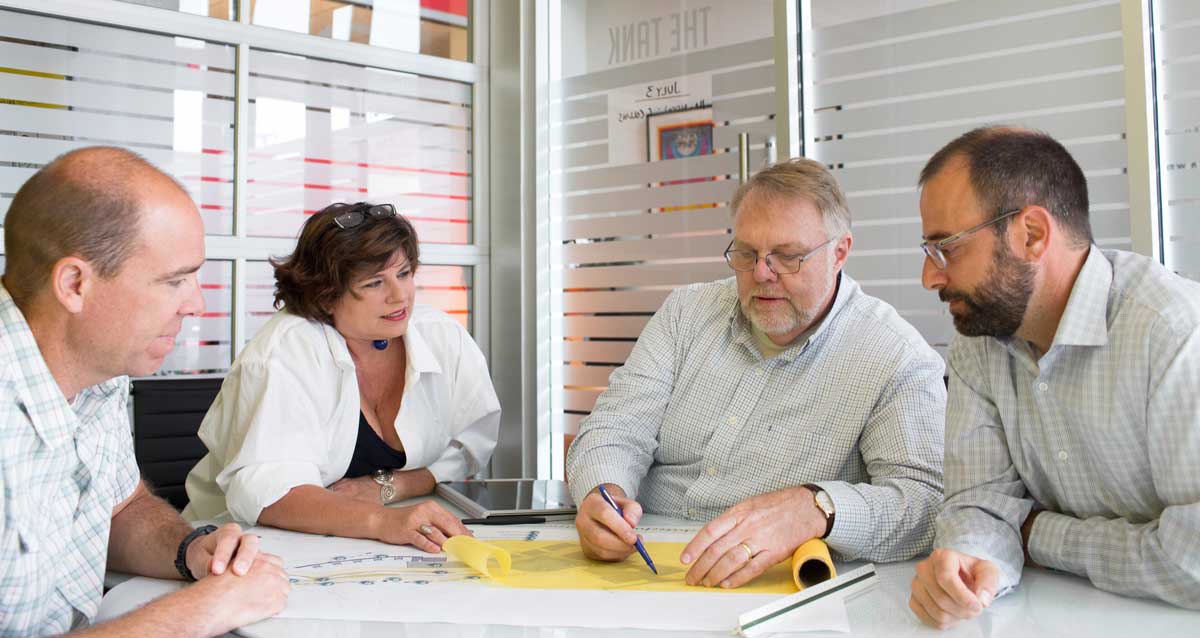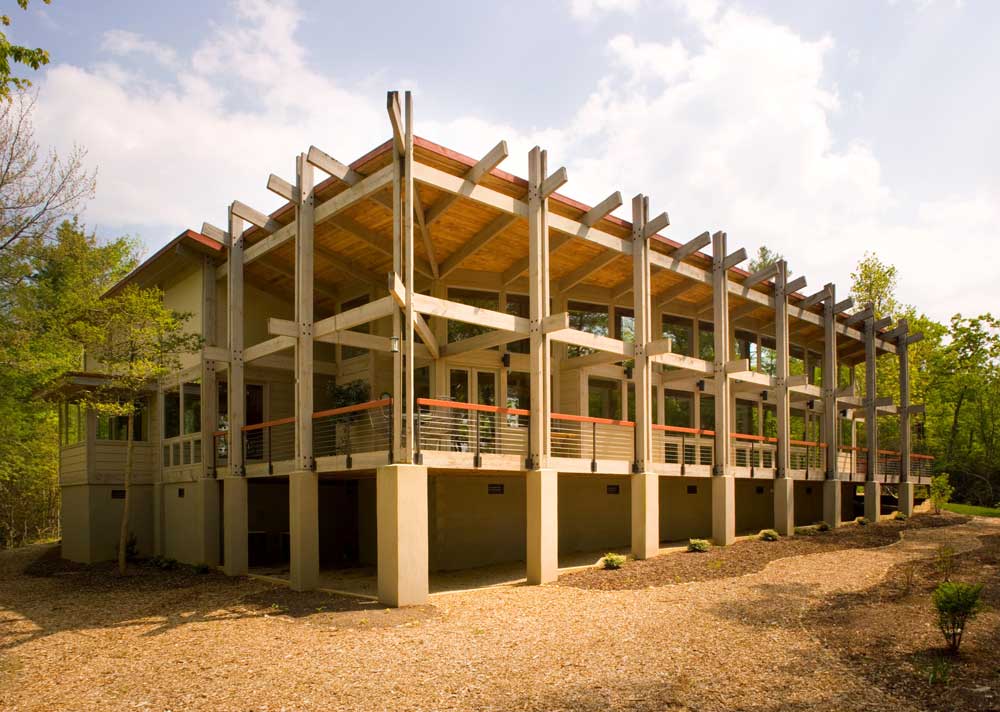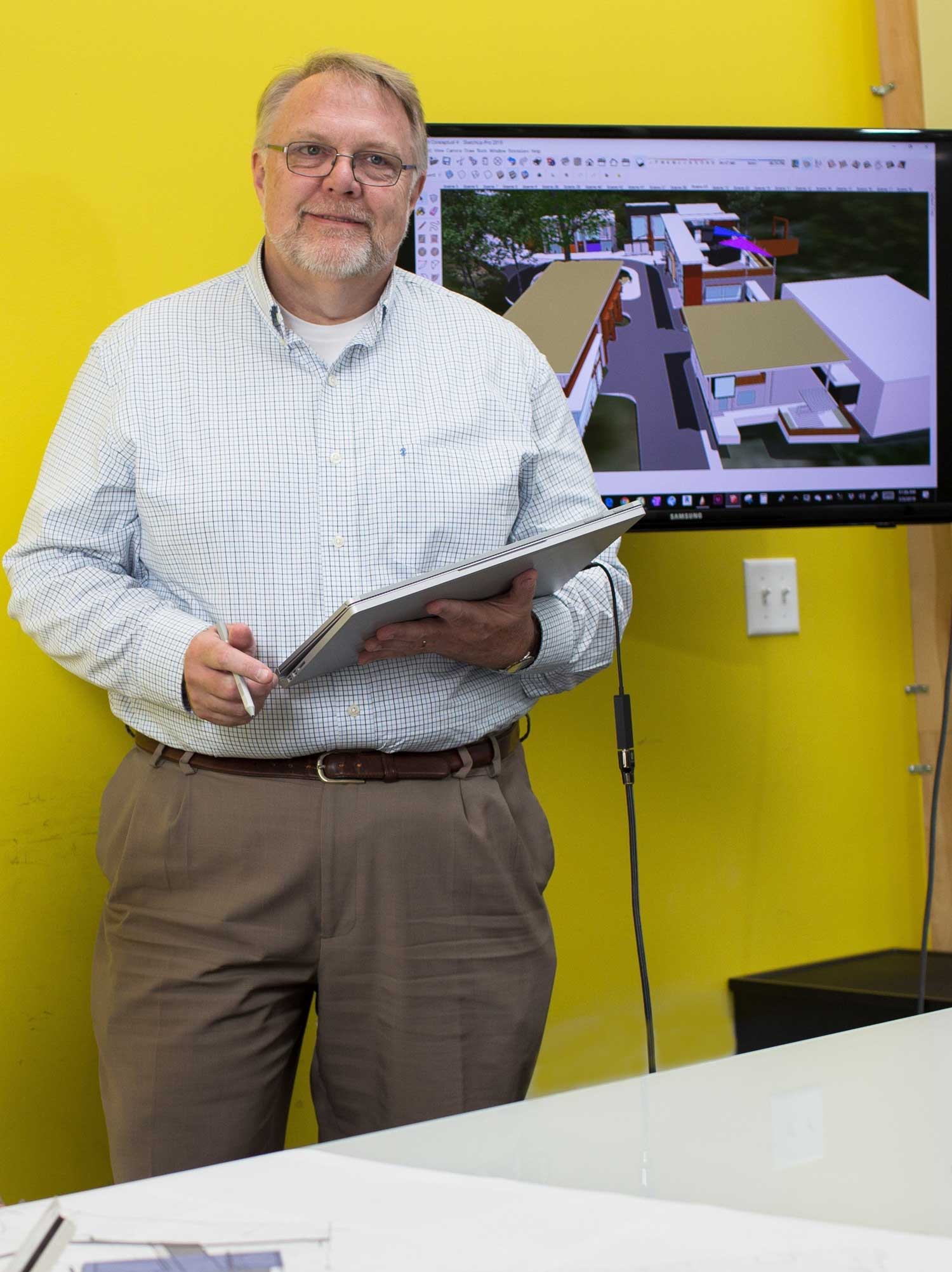Carleton Collins, AIA
Owner/Principal of CCA and Asheville native, Carleton has been serving clients in Western North Carolina for over 30 years upon completing his Master of Architecture at Clemson University in 1985. Throughout his career he has designed a wide range of building types and worked with a variety of public and private clientele on community focused projects.
Before establishing CCA in 2018, Carleton was Asheville Office Director for McMillan Pazdan Smith Architecture and spent the prior 15 years in his own private practice Progressive Architecture & Design, Inc. He has also worked with area firms Padgett & Freeman Architects (PFA) and John Rogers & Associates.
Recognized as one of the region's top designers, his work has been published in Carolina Home and Garden Magazine, featured on HGTV (Extreme Building, and What You Get for Your Money), selected for inclusion in Architizer's 2015 portfolio of international projects, and received Varco-Pruden’s 1995 Hall of Fame designation for the top 100 projects worldwide.
Carleton’s commitment to community is evident in his service on various boards, commissions, and committees throughout his career. Most recently he has enjoyed chairing the Asheville Area Riverfront Redevelopment Commission as they plan for an exciting future in the River Arts District. Through other experiences on the Historic Resources Commission, Urban Trail Committee, Streetscape Taskforce, and with Asheville Design Center, he has helped enrich our city. Out of a love for sports and kids, especially his, Carleton has enjoyed coaching Little League and Youth League Baseball, YMCA Basketball, and being Head Coach of Asheville Middle School Girls’ Softball team. He also enjoys spending time on the tennis court or on the trail in our beautiful mountains. Carleton is also an Eagle Scout and active member of Daniel Boone Council BSA’s Executive Board.
Vision
 Understanding, responding, and designing to a client’s needs and goals is fundamental for a successful project. In addition, clear communication and a great client experience is important. CCA’s vision is to take these basic ideals and broaden them to include a COMMUNITY design focus. At different scales and in different contexts, being connected to a strong sense of community is important to our individual and social well being. The built environment can have a positive influence on these and plays a key role in sustaining, shaping, and improving community life in general. Community can take many forms and has different meanings and value to those within it. It’s a part of our how we live, how we work, how we enjoy our free time, how we engage with others, and how we experience the world around us. Considering these is the important foundation for Thoughtful Community Design.
Understanding, responding, and designing to a client’s needs and goals is fundamental for a successful project. In addition, clear communication and a great client experience is important. CCA’s vision is to take these basic ideals and broaden them to include a COMMUNITY design focus. At different scales and in different contexts, being connected to a strong sense of community is important to our individual and social well being. The built environment can have a positive influence on these and plays a key role in sustaining, shaping, and improving community life in general. Community can take many forms and has different meanings and value to those within it. It’s a part of our how we live, how we work, how we enjoy our free time, how we engage with others, and how we experience the world around us. Considering these is the important foundation for Thoughtful Community Design.
THOUGHTFUL buildings respond to a client’s vision and connect it to their cultural and community context. They are smart, sustainable, functional and operationally sound. They integrate best practices to enhance client goals and user experience.
In COMMUNITY we discover a sense of place, find meaning and purpose, are connected, grounded, and engaged. Successful community focused design celebrates the diversity of culture and enriches the backdrop against which life happens.
DESIGN matters. Good design is collaborative, helps clients succeed, and adds value. Good design should: innovate, enable, and connect. Good design inspires the imagination, respects the environment, is economically viable, and has a clarity of purpose.

"Carleton was always available, responsive, helpful and pleasant to consult with. His expertise in working with people, contractors, inspectors, prison officials and our committee helped us achieve our goal far ahead of schedule and with a minimum of the normal frustration of any major building project."
- Rev. George Holley
Clinical Chaplain I, NC Department of Corrections
Design Values

CCA believes that architecture should reflect and enrich its culture and context, and, be appropriate to its time and place. We value the fundamental principles of MODERNISM that include: an honest, simple use of materials; a clarity of expression based on a building’s purpose; a sense of functional space that connects people to one another and their surroundings; integration of technology; and, responsibility to the client, society and the earth. We strive to incorporate these principles in ways that meet client needs, evoke excellence, and instill quality.
Sustainable Design
In a broad sense ‘sustainability’ has been around for a long time, but not necessarily been put into practice as in today’s terms. Moving from simple principles around proper ongoing care and maintenance (the ability to be sustained) to environmentalism, sustainable design in essence is being mindful of common sense strategies and seeking answers questions such as these:
- How can we work sensitively with the land?
- How do we take advantage of the sun, embrace the wind, and use water creatively?
- How can green materials, high-efficiency equipment, and other resources be integrated to improve a building’s efficiency and help conserve the environment?
CCA views every project as an opportunity to integrate sustainable features and many can be done without great impact to a project’s budget. During the design process we help to evaluate the potential cost/benefit and establish a baseline of priorities. Our general experience in sustainable design includes the following:
- LEED for New Construction
- LEED for Homes
- Methods, materials and strategies:
- Rainwater collection for use in landscape irrigation systems
- Utilizing recycled, reclaimed, or other ‘green’ building products
- Geo-thermal heating and cooling
- Hydronic in-floor heating
- Integrating high efficiency mechanical equipment, low-flow plumbing fixtures, and LED lighting
- Proper insulation and energy-efficient glazing for the thermal envelope
Design Approach
Each project has its own unique goals, functional and economic needs, and site context. To discover what design is best suited for these, CCA provides a very intentional, collaborative process that also seeks how the project can foster a sense of community. To achieve this we focus on understanding how the project can address People, Purpose, and Place. We typically provide services to clients in a series of phases, each with its own distinct goals:
Phase I Planning and Preliminary Design Services
During this phase we provide a variety of services whose aim is to establish the design intent, potential project cost, and support fundraising efforts, if needed. Some basic tasks in the design process include:
- Establish the Project’s Vision, Goals, and Program
- Perform Analysis, Research, Gather Stakeholder Input and Provide Community Engagement
- Develop Master Plans & Preliminary Building Designs
- Establish the Project Budget
- Define Project Phasing (if needed)
- Provide Collateral Materials for General Marketing and Fundraising (if needed)
Phase II Design and Documents Services
This phase focuses on further developing the architectural design, defining project materials, details, and equipment, designing building engineering systems, and elaborating all of these through drawings and specifications that can be used for bidding and construction. We will discuss methods for delivering the project’s construction and potential suitable general contractors. Also, the potential project cost is further refined and project documents are submitted for planning department, permitting, and other agency reviews.
Phase III Construction Services
After determining the best method for construction of the project in Phase II we provide administrative services to assist in finalizing the project cost (bidding or negotiation) and validating the quality and progress of construction. Making regular site visits, participating in project meetings, reviewing shop drawings and submittals, certifying contractor pay requests, and making inspections are just some of the duties we perform.
All the above represent a comprehensive, holistic approach to executing a project. The end goal? A successful project!

- J. Steven Taylor,
former Scout Executive and CEO,
Daniel Boone Council BSA

